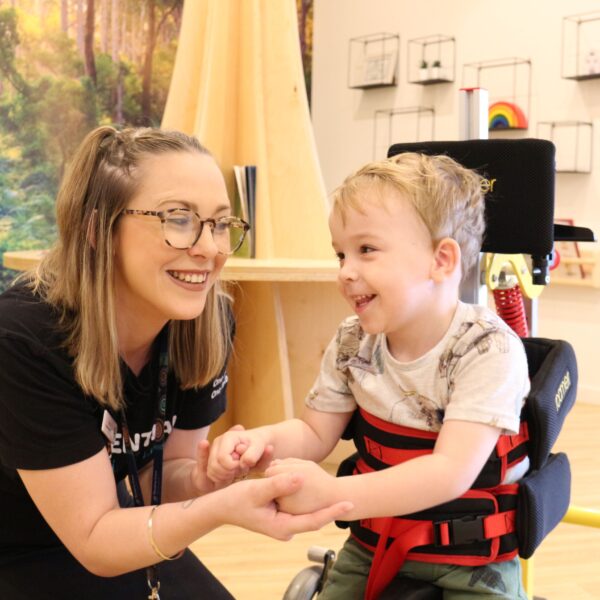My CP Guide – a resource of immense value for the ECEC sector

Recently The Sector was offered the opportunity to review My CP Guide, and to speak with a parent who had been on the advisory group which created the resource. The piece below introduces both the resource, and parent Audrey, who’s son Chandler has cerebral palsy and short bowel syndrome.
Many parents of children with additional needs will be familiar with Emily Perl Kingsley’s poem Welcome to Holland, the opening of which reads as follows:
“When you’re going to have a baby, it’s like you’re planning a vacation to Italy. You’re all excited. You get a whole bunch of guidebooks, you learn a few phrases so you can get around, and then it comes time to pack your bags and head for the airport.”
Only when you land, the stewardess says, “WELCOME TO HOLLAND.”
You look at one another in disbelief and shock, saying, “HOLLAND? WHAT ARE YOU TALKING ABOUT? I SIGNED UP FOR ITALY.”
But they explain that there’s been a change of plan, that you’ve landed in Holland and there you must stay…
For families who have a child who is diagnosed with cerebral palsy, the experience of learning to navigate a life they never anticipated for themselves, or for their child, can be daunting.
Likewise for professionals in early childhood education and care (ECEC) services who may never have worked with a family with cerebral palsy, a condition which causes abnormal brain development or damage to the developing brain. This usually happens before a child is born, but it can occur at birth or in early infancy. In many cases, the cause isn’t known, leaving families scrambling to adjust not only to parenthood, but to parenting a child with additional needs.

This was certainly the case for Audrey, who found herself adjusting to the news that son Chandler had been diagnosed with cerebral palsy and short bowel syndrome, a condition that means the body is unable to absorb enough nutrients from food because there is not enough small intestine.
Both conditions meant that when it came time to send Chandler to an early learning service, Audrey needed to be sure that Chandler would be well supported, and in a place with a team that understood his unique needs. His early learning experience started with a placement at three years of age in a kindergarten for children with additional needs, before moving to a ‘half and half’ model at four years of age, spending half his week in mainstream preschool and the other half in a more supported additional needs environment.
Having a supportive team of educators who were all on the same page was the key to success in both environments, Audrey said, however there was not a lot of curated information which shared perspectives on what it was like to have cerebral palsy, where educators could go for help and support, and ideas about how to support Chandler with important early years milestones like transitioning to school, making friends, or even navigating conflicting advice from various allied health professionals.
My CP Guide helps to make sense of a complex world
Remembering her lived experiences with Chandler is what drew Audrey to be part of the focus group which helped to develop My CP Guide, a comprehensive guide about cerebral palsy, developed by those with, and caring for those with, the condition, funded under the Australian Government’s Information Linkages and Capacity Building program (ILC.)
My CP Guide is continually updated to ensure educators, parents, families and other interested parties have access to the most current and credible information that the world has to offer when it comes to cerebral palsy.
Based on experience, the information comes from those who work in disability services, education, research, resource creation, as well as those living with the disability. Medical experts, allied health providers, researchers and advocates all contribute to the dynamic resource, headed up by a consortium of Australian organisations, led by Cerebral Palsy Australia.
Resources specific to ECEC
From the Introduction to Education – 0 to 3 years through to School readiness for children with CP the web based resource is packed full with guidance and resources to support educators and other ECEC professionals to build a team around the child and family with cerebral palsy.
“It would have been a great tool when Chandler started early learning,” Audrey said. “The guide would have supported the orientation process, and helped Chandler’s educators to learn more about cerebral palsy, having never worked with a child who had that condition before.”

My CP Guide allows users to create a profile which is specific to their needs, which keeps them up to date with relevant information in line with their profile.
As an evolving tool, contributions from users are always welcomed, allowing the ECEC sector to share insights and information about what works for them and their services.
To access My CP Guide please see here. Information of note for ECEC employees can be found in the “Education” section.
Popular

Quality
Practice
Provider
Research
Workforce
Honouring the quiet magic of early childhood
2025-07-11 09:15:00
by Fiona Alston

Practice
Provider
Quality
Research
Workforce
New activity booklet supports everyday conversations to keep children safe
2025-07-10 09:00:16
by Fiona Alston

Quality
Practice
Provider
Workforce
Reclaiming Joy: Why connection, curiosity and care still matter in early childhood education
2025-07-09 10:00:07
by Fiona Alston












